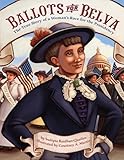
Dewey: 305.42092 or B Lockwood

Ballots for Belva: The true story of a Woman's Race for the Presidency by Sudipta Bardhan-Quallen, illustrated by Courtney A. Martin, Abrams Books, 2008
I always thought that Geraldine Ferraro was the first female vice presidential candidate in our nation's history.
She was not.
I knew about the presidential candidacies of Margaret Chase Smith, Shirley Chisholm and Bella Abzug but I had never heard of Belva Lockwood.
This colorful picture book biography will be a timely addition for U.S. election units as this election year has seen the presidential candidacies of Hillary Clinton and the vice presidential run of Sarah Palin.
Sudipta Bardhan-Quallen tells the fascinating story of Belva Lockwood who earned one of the first law diplomas ever awarded to a woman. Even though she had completed all the course work at the National University Law School, it refused to give her a diploma until she wrote to President U.S. Grant to demand her due.
She was the first woman to practice law in the federal court and the first to argue a case before the U. S. Supreme Court. She was nominated for President by the Equal Right Pary of the United States in 1884, while women still did not have the right to vote. Interestingly, some of the strongest opposition to her run for president came from women of the National Woman Suffrage Association. Ballot fraud probably denied Lockwood a substantial number of votes. She is officially credited with over 4,000 votes. Grover Cleveland's slim, winning vote margin in New York state was probably due to votes for Belva being counted for him.
A short glossary of election terms follows an informative author's note on Lockwood's remarkable achievements. A time line of women's suffrage in the United States is also included.
This is an interesting and engaging read about a little known corner of presidential election history.
1 comment:
I really enjoyed this one. I am eager for my students to give me some feedback.
Post a Comment